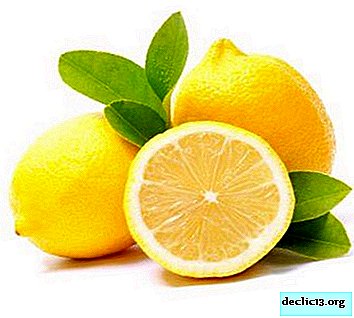Is it possible to give a child a lemon and when to try its introduction into the diet?

For each parent, it is important that their children consume only healthy and wholesome foods. Lemon is full of vitamins and minerals.
The beneficial properties of the fruit are recognized by both representatives of official medicine and national connoisseurs. Are citrus fruits useful for children? When to start taking them? Can lemons cause significant harm to the body?
We offer you to familiarize yourself with the pros and cons of drinking lemon, as well as learn six recipes of alternative medicine that will help cope with colds, vomiting and other diseases.
At what age can I eat?
When can I give a child a lemon to try, is it possible for an infant to be up to a year old and what exactly is allowed to eat fruit? From 6 months, you can offer your child to try lemon juice diluted with water with the addition of sugar. If after the test there are no signs of allergy or malaise, from 8 months begin to introduce lemon as a complementary food. At this age, the baby is able to distinguish between a sour taste, but this does not mean that he will like it.
If the child is prone to allergic reactions, postpone the start of lemon tasting until 3-5 years. Also keep in mind that a complete intolerance to the body of the fruit may occur.Beneficial features
Chemical composition
Lemon contains a large amount of vitamins and minerals, both in the pulp of the fruit and in the peel. Fruits are saturated with alkaline elements such as:
 potassium (163 mg);
potassium (163 mg);- calcium (40 mg);
- phosphorus (22 mg);
- magnesium (12 mg);
- sodium (11 mg);
- sulfur (10 mg);
- zinc (0.13 mg).
Also included:
- vitamin A (2 mcg);
- B vitamins (0.33 mg);
- vitamin C (40 mg);
- vitamin P (0.2 mg);
- Vitamin E (0.2 mg).
Lemon includes up to 8% organic acids and up to 3% sugars. One of the constituents of lemon is citric acid. It stimulates the production of lemon juice, is involved in the reactions of fat, carbohydrate and protein metabolism. Among the useful elements are terpenes, pectin, tannins. In a tablespoon of the peel of one lemon contains 13% of the daily intake of vitamin C, and in the juice of one lemon - 33%.
Indications for use
- Citric acid increases appetite, which is useful for babies who constantly do not want to eat.
- Pectin substances guarantee the removal of heavy metals from the body.
- Vitamins A and C protect against numerous microbes and viruses, act as protection for the body.
- Lemon juice is good for the cardiovascular system and kidney function.
- Vitamin D is considered necessary for the child's body. It favorably affects the correct development of the baby, protects against rickets and strengthens unstable children's immunity.
- Useful for diseases such as chronic tonsillitis, pharyngitis, stomatitis.
Side Effects and Precautions
Contraindications
With all the mentioned beneficial properties, lemon still has a detrimental effect on health. Still, he belongs to the family of citrus fruits, which are often strong allergens.Pediatricians do not recommend a lemon for eating, since an excess of citric acid is harmful to the children's stomach and intestines. Also, a sufficient amount of fruit acids in the product causes a negative effect on tooth enamel.
For inflammatory processes that occur in the body, use lemon at the first sign of inflammation. Otherwise, the use of lemon will intensify the irritation that has arisen, aggravate pain, stop the processes of healing of bleeding wounds.
Limitations and Precautions
 If an allergic reaction to lemon occurs, it is worth stopping its consumption. It should be understood that if the baby’s parents are prone to allergic reactions, and even more so to citrus fruits, then the baby is most likely to have an allergy. Same, after the first intake of lemon, a rash may appear on the skin around the lips that is not related to an allergic reaction. In this case, it is necessary to take a break in the use of the product for 3-5 days.
If an allergic reaction to lemon occurs, it is worth stopping its consumption. It should be understood that if the baby’s parents are prone to allergic reactions, and even more so to citrus fruits, then the baby is most likely to have an allergy. Same, after the first intake of lemon, a rash may appear on the skin around the lips that is not related to an allergic reaction. In this case, it is necessary to take a break in the use of the product for 3-5 days.
So that the fruit does not destroy tooth enamel and does not cause irritation of the gastrointestinal tract, do not get involved in the consumption of lemon. In small quantities, lemon and lemon juice are good for health and will not harm the body in any way, you should know and understand the measure.
How to enter the diet?
Children from six months to add 3-5 drops of lemon juice in tea or compote, then, if the health condition has not worsened, increase the dose within reasonable limits.
Older children are invited to try citrus as complementary foods, cut into small segments. There is a high probability that the child will like the taste of the fruit, since the receptors on the baby’s tongue are poorly developed and do not fully feel the taste of lemon. If, after all, the sour taste of citrus is not pleasant for a child, you can sprinkle the sliced slices with sugar. Sugar will prevent excess acid and help improve palatability.
Medicinal use
Each housewife is able to prepare the following simple recipes from lemon to prevent various diseases.
From sores in the mouth
Give the baby to chew 1-2 small slices of lemon. It is no longer necessary, since citric acid in this case will damage the fragile enamel. If this method does not help get rid of sores, we recommend that you consult a doctor.
To strengthen immunity
The benefits and effects of lemon on the immune system have already been described. If you add honey and ginger to it, the result will be overwhelming.
There is a simple recipe:
- take the peeled ginger root (2 pcs.);
- add fresh honey (about 400 grams) and 2 lemons with a thin peel.
With sore throat
If you feel sore throat, rinse your throat with lemon juice. To do this, squeeze a quarter of a lemon and add 150 ml of water. Gargle with the resulting solution once an hour. After a couple of days, the child will feel relief.
With a cold
 At the first sign of a cold, prepare a mixture of lemon, butter and honey:
At the first sign of a cold, prepare a mixture of lemon, butter and honey:
- pour lemon over boiling water, then twist through a meat grinder;
- add 100 g of softened butter and 1 tablespoon of honey to the resulting mass;
- mix thoroughly and get a homogeneous mass, which we use to make sandwiches.
By the way, it is better to give preference to brown bread.
From vomiting
For vomiting caused by indigestion, mix half a teaspoon of lemon juice with a teaspoon of natural honey. Such a tool will help relieve vomiting.
Against diarrhea
Diarrhea among young children is a common occurrence, but by no means harmless. If the baby is tormented by diarrhea, it is important to take care of restoring the water-salt balance. This can be done with diluted lemon juice. To do this, mix in a glass a tablespoon of juice, a pinch of salt and sugar. Give the child the prepared solution in small portions, a teaspoon.
Lemon is a storehouse of healthy vitamins and minerals. However, do not be fanatical about eating this fruit. For infants, it is contraindicated, older children can be gradually introduced into complementary foods and closely monitor the body's reaction. Doctors advise starting an appointment from 8-10 months.
Lemon prevents the development of serious colds, boosts immunity, and helps prevent gastrointestinal upsets. It will not cause tangible harm, with the right dosage, lemon, like any medication, is useful. Do not be afraid to use it for medicinal purposes, but remember, if the slightest signs of allergy or other disorders occur, stop taking lemon and consult a doctor.

 potassium (163 mg);
potassium (163 mg);















